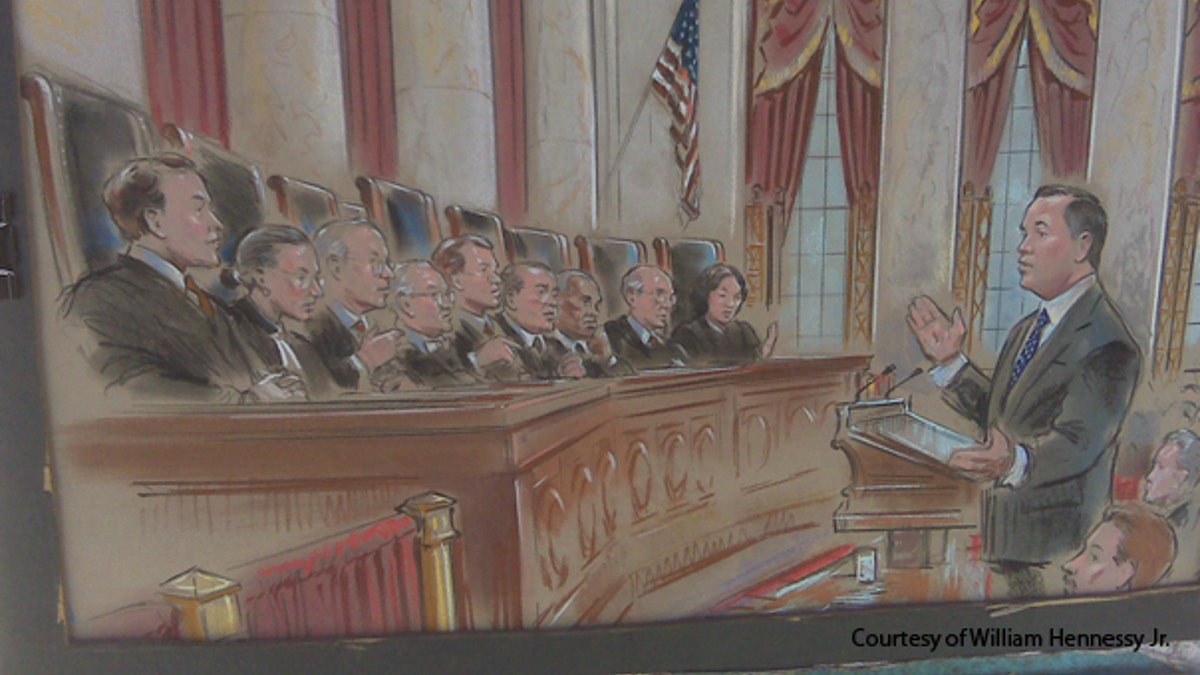
This sketch shows the Supreme Court listening to arguments in a case about text messages April 19. (Courtesy of William Hennessy Jr.)
Be careful what you text. Your employer could be watching -- and may have the backing of the Supreme Court.
The Supreme Court appears poised to side with a public employer in a dispute over the privacy rights of an employee who was busted for sending an excessive number of text messages, many of which were sexually charged, on his work-owned pager.
The case involved complaints from California police officers that the department violated their privacy by reading the messages.
A ruling in favor of the department on the issue of so-called "sexting" could impact millions of American workers who use work-issued phones and Blackberries. It would jeopardize their ability to keep private messages sent on those devices free from supervisor review.
"I think that the lesson to take away is you should have a private phone or text messager in addition to your public phone if in fact you want to say things that you don't want anyone to look at," attorney Kent Richland said following Monday's oral arguments where he defended the employer's decision to look at the text messages.
Chief Justice John Roberts stood out during the hour-long arguments for his apparent isolation in scrutinizing the Ontario, Calif., police department's decision to examine the texting records of Sgt. Jeff Quon.
Roberts said "it would be reasonable for (Quon) to assume that private messages were his business" given the department's day-to-day policy of allowing personal messages on city-owned without review and that a subsequent search of Quon's texting history violated his Fourth Amendment rights.
Most of the other justices appeared to place greater significance in the department's written policy -- which predated the distribution of the pagers -- warning officers that all communications on city-owned computers were subject to review. Department officials later held a meeting warning officers, including Quon, that pagers were also covered by the city's policy.
Justice Stephen Breyer in particular seemed lean in favor of the city's argument.
"The city owns the pager. It's a pager used for work. They are giving a privilege to people if they want to use it off work," he said.
Quon's lawyer, Dieter Dammeier, argued the pagers were different from computer-based e-mail messages that rely on an in-house server system to process. The pagers utilized an outside communications company to facilitate the messages, which in his view heightened Quon's expectation of privacy. Dammeier also objected to the search of his client's messaging history, arguing the city could have used less-intrusive ways to determine if Quon was misusing his pager.
Breyer concluded that the decision to look at the messages was a reasonable way to determine if the pager was being properly used.
"I don't see anything, quite honestly, unreasonable about (the search), where you are the employer ... where you are paying for this in the first place," he said.
Quon was part of the department's SWAT team and was given the pager to help expedite internal communications. Several months after the pager was issued, Quon's boss asked for a read-out of his messages because Quon had repeatedly exceeded his monthly message allowance.
As it turned out, most of Quon's texts were not work-related and many were sexual in nature, with the majority of the personal messages going to Quon's estranged wife, his office girlfriend and a fellow officer. An official reprimand was put into Quon's personnel file.
Quon and the people he was messaging sued, claiming the boss had no right to look at the communications. They initially lost their case when a jury concluded the chief's decision to look at the messages was prompted by concerns over the cost of the messages. But a federal appellate court later ruled in their favor.
Justice Antonin Scalia said the reason for the search was irrelevant to the case. "So when the -- when the filthy-minded police chief listens in, it's a very bad thing, but it's not offending your right of privacy," Scalia observed.
A decision is expected by the end of June.




